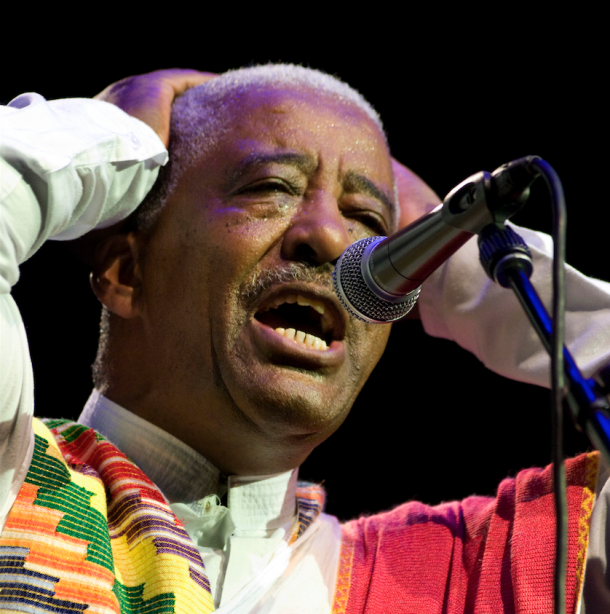



As one of the figureheads of the golden age of modern Ethiopian music, Mahmoud Ahmed has led an extraordinary life. Starting out shining shoes and working odd jobs in a nightclub, his first moment in the spotlight came about almost by chance at the beginning of the 60s and since then he has piled success upon success, most famously with the eternal classic “Ere Mela Mela”. A look back at an interview from 2002.
Your music seems heavily influenced by African American culture. What were your initial influences?
Right at the beginning my first influences were Ethiopian singers, people like Tefera Kassa and Tlahoun Gessesse who were in Haile Selassie’s Imperial Body Guard band before me – not forgetting Alèmayèhu Eshèté of course, the Ethiopian Elvis.
At the beginning of the 70s I ran a record shop. I used to listen to an independent radio station called “Voice of the Gospel” and watch a lot of films, and through them I discovered singers like Sam Cooke, Nat King Cole, Harry Belafonte, Little Richard and James Brown. I remember seeing Elvis Presley’s “Jailhouse Rock” at the cinema – what a lesson! I learned a lot by watching how they acted on stage.
Theoretically they all made very different styles of music but ultimately it is all based on the blues – the same for me too. I took parts of soul, rhythm’n’blues, rock and jazz to create my own sound. The most interesting for me was the huge variety of rhythms coming from America.
At the same time other musicians elsewhere in Africa were creating their own new styles that were influenced by American funk, soul and jazz. Did you know about Fela?
No, I only heard about him much later! was lucky enough to meet Myriam Makeba and Hugh Masekela when they came to play in Addis Ababa, and I began to see the connections with South African music. I could hear a certain similarity with urban Ethiopian music before the revolution in 1974, similarly for the music of Mali, Guinea and Senegal. The rhythms of the Sabar drums and what we call “Martinique beats” are very familiar to us. It’s natural – you have to understand that in the south of Ethiopia there is a lot of music that is very similar to Black African music: dorzé, waleyta, etc… I am from the Gouragués tribe, known for their great voices. But in the 60s we mostly had access to Sudanese, Nubian, Egyptian and Yemeni productions. Paradoxically, despite the fact that the emperor Haile Selassie was one of the founders of the OAU (Organisation of African Unity, precursor to the African Union), we had very little exposure to other African cultures. For example I never participated in FESPAC, and when we played in Kenya or South Africa it was always just shows for the Ethiopian community.
We often talk of the golden age of Ethiopian music, what is the current scene like?
It’s true there was a golden age, the emperor financed the big orchestras and they were real institutions. That was my school, it was where I started my career when I was a last-minute replacement for a singer in the Imperial body guard band. At the beginning of the 60s the body guard band dominated the Ethiopian scene. From the beginning of the 70s the big bands began to lose their best players as they left to form their own smaller groups, but it was with the military dictatorship in 74 that things really took a downward turn – the big orchestras weren’t what they once were and nothing really took their place. Nonetheless the quality of the arrangements – what marked us out – lasted despite the economic difficulties and political censorship.
There are still arrangers in Ethiopia today but they aren’t organized and as there are aren’t any long-running orchestras left the work is piecemeal. It’s down to economics – no-one wants to invest in an orchestra, not even the government! It should be up to the ministry of culture to help us and encourage a renaissance of the arts. We can’t rely on producers, they are only interested in short-term gain.
Your music takes on another dimension in concert…
Concerts are fundamental. That’s where the audience is and where I can best connect with them, especially when I’m touring abroad where the conditions are very different from those in Ethiopia. In Addis Ababa I mainly play for private parties but in Europe and the United States I play at major events. The audience doesn’t always respond in the same way. In France the audience is very knowledgeable, like connoisseurs, but whether the audience understands the lyrics or not I don’t change my set. The main thing is to feel the music beyond the words.
Thanks to Francis Falceto for the pics, and his help in 2002…